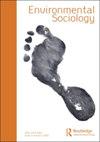感知的环境威胁、地点依恋和自然资源就业:预测离开受威胁海岸线的意愿
IF 2.8
Q3 ENVIRONMENTAL STUDIES
引用次数: 1
摘要
摘要本研究考察了路易斯安那州东南部居民在面临环境威胁时迁移意愿的预测因素,该地区易发生灾害,面临海岸侵蚀和环境污染等缓慢的迁移威胁。使用家庭层面的调查数据,我测试了对家庭、地方依恋和就业行业的感知威胁数量与搬家意愿之间的关系。结果表明,感知到的威胁数量与迁移意愿呈正相关,对渔业的依恋和联系与迁移意愿呈负相关。根据脆弱性和复原力范式,我将感知到的威胁和行动意愿之间的联系概念化为一种适应能力,并将地方依恋和不愿行动的渔业联系概念化作为一种脆弱性。这些分析深入了解了越来越多美国人面临的一个问题,即气候变化引发的选择性移民。本文章由计算机程序翻译,如有差异,请以英文原文为准。
Perceived environmental threats, place attachment, and natural resource employment: predicting willingness to move from a threatened coastline
ABSTRACT This study examines the factors predicting willingness to move, in the face of environmental threats, among residents of southeast Louisiana, a region prone to disasters and facing slower moving threats, such as coastal erosion and environmental pollution. Using household-level survey data, I test the relationships that the number of perceived threats to one’s home, place attachment, and industry of employment have with willingness to move. Results indicate that the number of perceived threats is positively related with willingness to move, and place attachment and ties to the fishing industry are negatively related with willingness to move. Drawing on vulnerability and resilience paradigms, I conceptualize the connection between perceived threats and willingness to move as an adaptive capacity, and I conceptualize the connections between place attachment and ties to the fishing industry with unwillingness to move as a form of vulnerability. These analyses provide insight into an issue facing more and more Americans, elective climate-change-induced migration.
求助全文
通过发布文献求助,成功后即可免费获取论文全文。
去求助
来源期刊

Environmental Sociology
ENVIRONMENTAL STUDIES-
CiteScore
4.60
自引率
12.00%
发文量
34
期刊介绍:
Environmental Sociology is dedicated to applying and advancing the sociological imagination in relation to a wide variety of environmental challenges, controversies and issues, at every level from the global to local, from ‘world culture’ to diverse local perspectives. As an international, peer-reviewed scholarly journal, Environmental Sociology aims to stretch the conceptual and theoretical boundaries of both environmental and mainstream sociology, to highlight the relevance of sociological research for environmental policy and management, to disseminate the results of sociological research, and to engage in productive dialogue and debate with other disciplines in the social, natural and ecological sciences. Contributions may utilize a variety of theoretical orientations including, but not restricted to: critical theory, cultural sociology, ecofeminism, ecological modernization, environmental justice, organizational sociology, political ecology, political economy, post-colonial studies, risk theory, social psychology, science and technology studies, globalization, world-systems analysis, and so on. Cross- and transdisciplinary contributions are welcome where they demonstrate a novel attempt to understand social-ecological relationships in a manner that engages with the core concerns of sociology in social relationships, institutions, practices and processes. All methodological approaches in the environmental social sciences – qualitative, quantitative, integrative, spatial, policy analysis, etc. – are welcomed. Environmental Sociology welcomes high-quality submissions from scholars around the world.
 求助内容:
求助内容: 应助结果提醒方式:
应助结果提醒方式:


